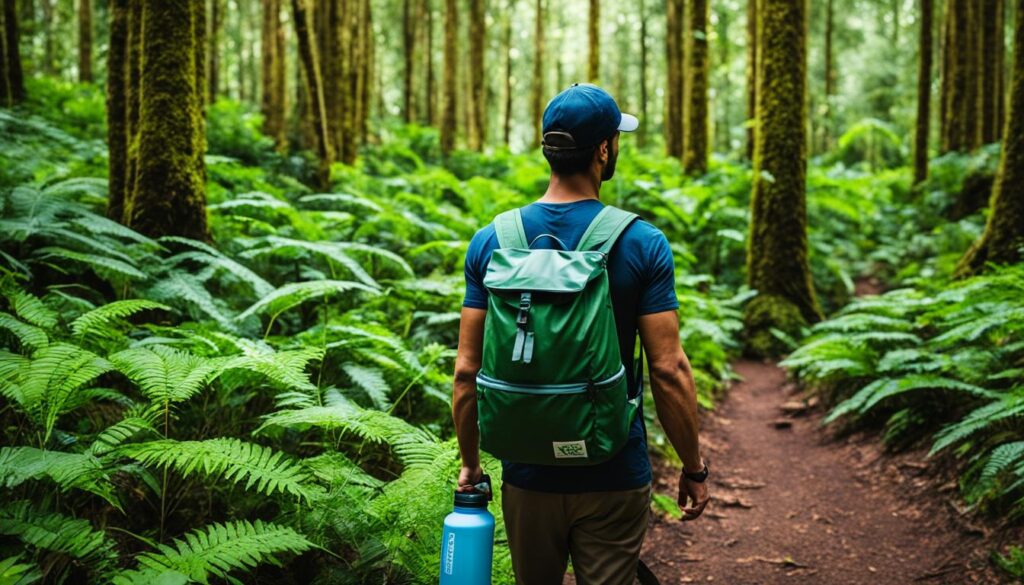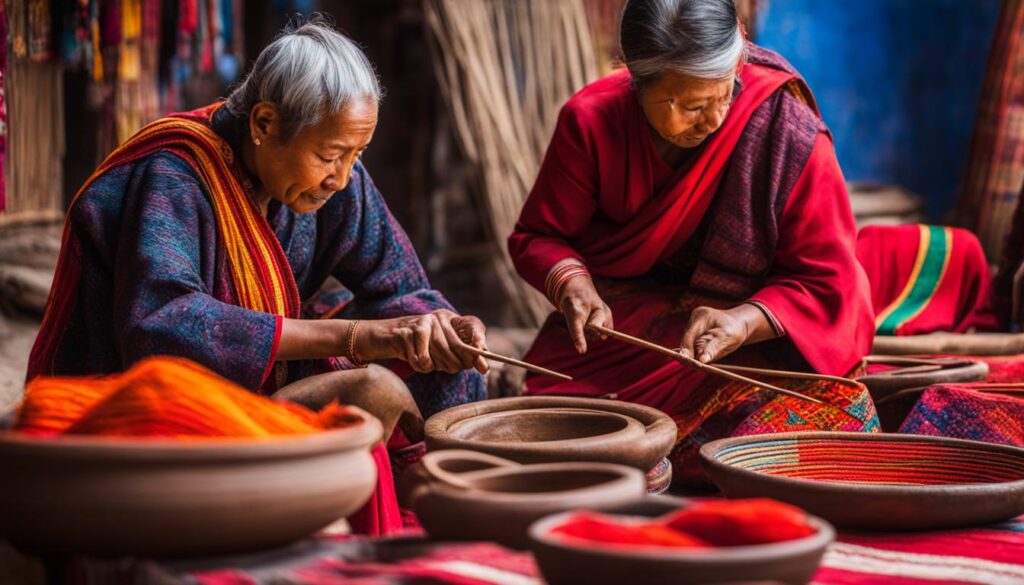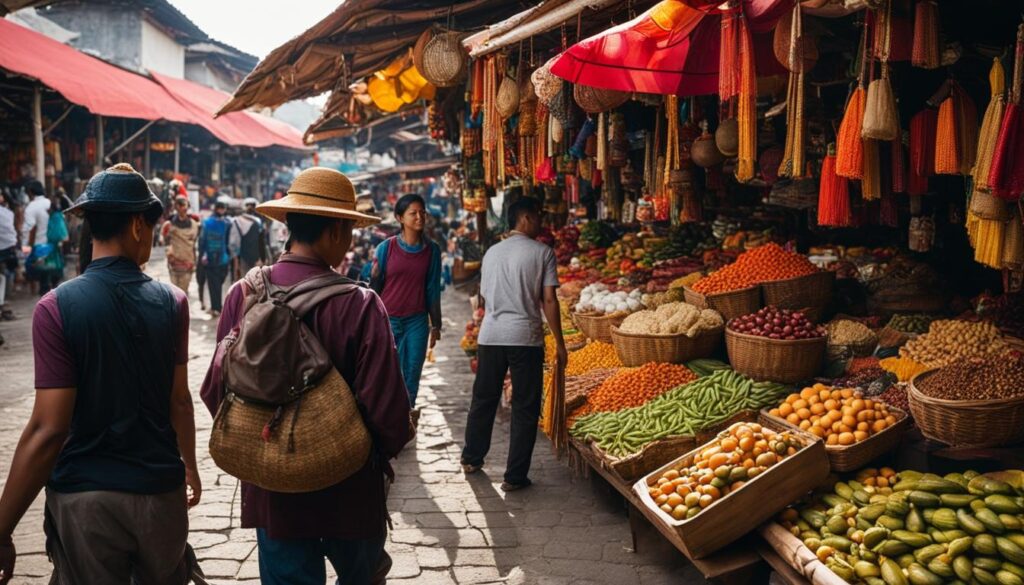Are you planning your next big adventure? As a responsible traveler, it’s essential to consider the impact of your actions on the environment, local communities, and cultural heritage. In this comprehensive guide, we’ll explore the principles of ethical travel and cultural respect. Whether you’re a seasoned traveler or new to the scene, this guide is filled with valuable insights and practical tips to help you travel responsibly.
By embracing ethical travel practices and cultural sensitivity, you can help preserve the world’s natural resources and unique traditions while enjoying unforgettable experiences. Throughout this guide, we’ll cover everything from understanding ethical travel to supporting local economies and minimizing your environmental impact. Let’s dive in and discover how you can become a responsible traveler and engage in sustainable and eco-friendly travel practices that honor local traditions.
Join us on this journey to responsible tourism!
Understanding Ethical Travel
As a responsible traveler, it is essential to understand the concept of ethical travel. Ethical travel practices involve making conscious choices to minimize harm to the environment and communities you visit.
As a responsible traveler, you can have a positive impact on your travel destinations by embracing ethical travel practices. By reducing your environmental footprint, respecting local cultures, and supporting local economies, you can make a difference and travel with a purpose.
Some ethical travel practices include:
- Choosing eco-friendly accommodations
- Using public transportation or sustainable travel options
- Respecting local customs and traditions
- Supporting local economies by purchasing locally made products and dining at locally owned establishments
By learning and embracing ethical travel practices, you can become a responsible traveler and positively impact the destinations you visit. Your actions matter, and by traveling with intention, you can help to preserve the natural and cultural resources of our world for generations to come.
Cultural Sensitivity and Awareness
Immersing yourself in the local culture is a hallmark of responsible tourism. However, cultural sensitivity and awareness are crucial to preserve the cultural heritage of your destination. By engaging in respectful travel practices, you can show appreciation for the local customs and traditions, contributing to the preservation of their identity and history.
Why Cultural Preservation Matters
Cultural preservation refers to the efforts made to safeguard the unique cultural heritage of a community or a destination. It encompasses the customs, traditions, language, art, music, and architecture that make a place distinctive. Each culture represents a valuable part of humanity’s history and diversity, worthy of celebration and protection.
When a community’s cultural heritage is threatened or lost, so is their sense of identity, and their ability to express themselves. This can lead to a loss of pride in their heritage, leaving them vulnerable to cultural appropriation and erasure. It is therefore essential to preserve the culture of the people you visit by showing respect and practicing responsible tourism.
Cultural Sensitivity and Awareness Tips
Here are some ways to show your cultural sensitivity and awareness while traveling:
- Learn about the history and customs of your destination – Do some research and read up on the local traditions and guidelines for interaction.
- Show respect for local dress codes – Respect the dress codes and practices of the local community.
- Learn a few phrases in the local language – Learning a few phrases can help break the ice and show respect for the local community.
- Avoid photography without consent – Be respectful when taking photos. Always ask for permission before taking a picture of someone, and respect their decision if they say no.
- Buy locally made products – Support the local economy and preserve cultural traditions by purchasing locally made products.
- Respect sacred places – Refrain from touching or harming sacred places and objects. They are an integral part of the local community’s identity and should be treated accordingly.
By following these cultural sensitivity and awareness tips, you can have a more authentic and enriching travel experience while preserving the cultural heritage of the places you visit.
Researching and Planning Responsible Travel
When it comes to responsible tourism, proper research and planning are essential to ensure that you choose ethical and sustainable options throughout your trip. By taking the time to do your homework, you can make informed decisions that support responsible and sustainable tourism practices.
Choosing Ethical Accommodations
One crucial aspect of responsible tourism is selecting accommodations that prioritize sustainability and ethical practices. Look for hotels and resorts that have environmental policies in place, such as solar power or water conservation measures. Additionally, consider staying with local families or in eco-lodges to minimize environmental impacts and support local communities.
Transportation and Sustainable Travel
When researching transportation options, seek out companies that prioritize sustainability. Consider taking public transportation, renting bikes, or choosing hybrid or electric rental cars. By minimizing your carbon footprint, you’ll be taking an important step towards responsible tourism.
Choosing Sustainable Activities
When planning your itinerary, consider the environmental and social impact of the activities you’re interested in. Choose activities that respect cultural heritage, promote sustainability, and minimize negative impacts on the environment and local communities. Consider volunteering with reputable organizations or participating in responsible tourism initiatives to further contribute to the destinations you visit.
Minimizing Environmental Impact
As a responsible traveler, it’s important to minimize your environmental impact during your trips. Fortunately, there are many eco-friendly and sustainable travel practices that you can adopt.
One way to reduce your carbon footprint is to choose eco-friendly accommodations that prioritize sustainability, such as hotels and resorts that use renewable energy sources and implement water-saving measures. Additionally, consider opting for public transportation or walking instead of renting a car or taking taxis, which contribute to carbon emissions.
Bring Your Own Reusable Items
To avoid wasting resources and creating unnecessary waste, bring your own reusable items such as water bottles, coffee cups, utensils, and shopping bags. You can also reduce your use of plastic by refusing straws and taking only the necessary toiletries when staying at a hotel.
Support Sustainable Tourism
Supporting sustainable tourism initiatives is another way to reduce your environmental impact and support local economies. You can choose to participate in activities that prioritize responsible and eco-friendly practices, such as wildlife conservation tours or eco-trekking expeditions, or visit destinations that focus on sustainable tourism development.
“The traveler sees what he sees. The tourist sees what he has come to see.” – Gilbert K. Chesterton
By implementing these simple tips, you can help preserve the environment and promote sustainable tourism. Let’s contribute to a greener and more responsible travel industry for generations to come.
Engaging with Local Communities
When traveling, it is essential to engage with local communities respectfully, supporting their livelihoods, and contributing positively to their communities. Here are some ways to engage with locals ethically:
- Learn basic phrases in the local language, such as “hello,” “thank you,” and “please.”
- Attend cultural events and festivals, respecting local customs and traditions.
- Respect local dress codes and behavior norms.
- Ask for permission before taking pictures of people or in sacred places, and respect their wishes if they decline.
- Buy locally made products to support the local economy, and avoid buying products that exploit natural or cultural resources.
- Choose tours and activities that engage with the local community, such as community-run projects, guided walks, or cultural immersion experiences.
By engaging with local communities respectfully, you can make a positive impact while gaining a deeper understanding of the local culture and way of life.
Supporting Local Economies
As a responsible traveler, it’s important to support the local economies of the destinations you visit. Buying locally made products, dining at local restaurants, and participating in responsible economic initiatives are great ways to do your part in promoting ethical tourism and supporting the local communities. By doing so, you not only contribute to the well-being of the people but also get to experience the authentic culture and flavor of the place.
When shopping, be sure to look for unique, locally made crafts and goods as souvenirs. Not only will you have a meaningful souvenir, but you will also support local artisans and craftsmen. Similarly, dining at local establishments is an excellent way to try regional specialties and support the local economy. By eating at local restaurants that source their ingredients locally, you reduce the carbon footprint and help preserve the environment.
Participating in responsible economic initiatives such as community-based tourism or responsible volunteering also supports the local economy and provides meaningful experiences. By engaging in activities that provide economic benefits to the locals, you help establish sustainable economic opportunities that benefit both the visitors and the host communities.
“Travel is an investment in experiences, culture, and people. By supporting ethical tourism practices that promote the local economy, you not only get to enjoy authentic experiences but also contribute to the well-being of the people and the environment.”
Local Economic Benefits of Ethical Tourism
| Benefit | Example |
|---|---|
| Job Creation | Barbara, a local resident, got a job doing ecotourism for tourists visiting her hometown. |
| Preservation of Culture and Tradition | A local tour company only hires guides who are indigenous to the region they work in. By doing so, they keep traditional practices and customs alive. |
| Local Entrepreneurship | A local woman started a small business selling handmade blankets. The tourists who come to her town love her products and have helped her grow her business so she can support her family. |
By supporting the local economy, you help to create a positive impact on the people and the environment. You can feel good that your travel experiences contribute to the preservation of cultural heritage, traditions, and environment while supporting the livelihoods of the locals.
Protecting Natural and Cultural Resources
Preserving natural and cultural resources is crucial for sustainable travel and cultural preservation. As a responsible traveler, there are steps you can take to minimize your impact on the environment and local communities:
Reduce Your Carbon Footprint
To reduce your carbon footprint, consider taking alternative transportation such as public transit or biking where possible. If you must drive, rent a hybrid or electric car. Additionally, minimize waste by bringing a reusable water bottle and shopping bag. You can also support eco-friendly accommodations that implement sustainable practices.
Respect Cultural Heritage Sites
When visiting cultural heritage sites, be respectful of the area and follow designated paths. Avoid touching or damaging any structures or artifacts, and do not remove any natural or cultural resources such as plants, rocks, or shells. Additionally, be mindful of local traditions and dress appropriately to avoid offending the community.
Support Conservation Efforts
You can support conservation efforts by donating to reputable organizations or participating in responsible tourism activities such as wildlife safaris or ecological tours. Some hotels and tour operators also offer sustainable initiatives such as beach cleanups or reforestation projects.
By taking these measures, you can ensure the preservation of natural and cultural resources for future generations. As a responsible traveler, you can make a significant difference in sustainable travel and cultural preservation.
Responsible Photography and Social Media
Photography and social media are integral parts of our travels, allowing us to share our experiences with the world. However, it’s essential to practice responsible photography that respects the privacy and dignity of the people and places you capture. Here are some ethical travel practices to keep in mind:
Seek Permission
Before taking pictures of people, always ask for their permission first. Respect their wishes if they decline, and don’t pressure them to change their mind. Note that in some cultures, taking photographs of people is considered disrespectful, so do your research beforehand.
Respect Local Traditions
Be mindful of local customs and traditions when taking pictures of cultural or religious sites. Some places prohibit photography altogether, and others allow it but without flash or certain angles.
| Do | Don’t |
|---|---|
| Take pictures of historic sites and landmarks from a distance or designated areas. | Take selfies or jump shots in sacred sites. |
| Take pictures of people showcasing their cultural heritage. | Take pictures of people in compromising or inappropriate poses. |
| Support local artists by purchasing their photographic works. | Take pictures of beggars or homeless people without their permission. |
Be Mindful of Your Social Media Posts
Social media has a massive impact on the places we visit. What we post can attract more visitors, but it can also damage the environment or culture we admire. Before sharing your photos online, consider the following ethical travel practices:
- Ask for permission before posting pictures with other people.
- Avoid tagging exact locations of sensitive areas.
- Be respectful when posting comments or reviews of local businesses or attractions.
- Don’t post pictures or videos that encourage harmful tourist behavior, such as feeding or disturbing wildlife.
Final Thoughts
Responsible photography and social media use are crucial ethical travel practices that respect the privacy and dignity of the people and places we encounter. By being mindful of local customs and traditions, seeking permission, and being mindful of our online presence, we can contribute positively to the communities we visit.
Ethical Volunteering and Giving Back
As a responsible traveler, you have an opportunity to contribute meaningfully to the communities you visit through ethical volunteering and giving back. However, it’s essential to do your research and ensure that your actions are aligned with ethical travel practices to avoid any unintended harm.
When choosing an organization to volunteer with, look for those with a transparent mission, clear objectives, and established support within the local community. Ensure that the organization values sustainable development and community empowerment through local partnerships and capacity-building initiatives.
It’s crucial to engage in responsible and sustainable tourism practices, even when volunteering. Be mindful of your environmental impact, reduce waste, and respect local customs and traditions.
When it comes to giving back, consider supporting local businesses and markets by purchasing locally made products and souvenirs. Participate in responsible economic initiatives that empower locals and promote sustainable development.
Remember, ethical volunteering and giving back can have a positive impact on the communities you visit while providing you with a more fulfilling travel experience. By engaging in responsible tourism practices, you can help preserve the world’s cultural heritage while traveling responsibly.
Reasons to Engage in Ethical Volunteering and Giving Back
| Reasons | Explanation |
|---|---|
| Contribute to local development | By volunteering with reputable organizations, you can help promote sustainable development and empower local communities |
| Deepen cultural understanding | By giving back and engaging with locals, you can gain a deeper understanding of different cultures and customs. |
| Positive impact | By supporting local businesses and economies, you can have a positive impact on the communities you visit. |
“Travel is more than the seeing of sights; it is a change that goes on, deep and permanent, in the ideas of living.” -Miriam Beard
Conclusion
In conclusion, being a responsible traveler is not only crucial for preserving the natural and cultural resources of the destinations you visit but also for supporting local economies and communities. By embracing ethical travel practices and cultural respect, you can create unforgettable experiences that have a positive impact.
Remember to prioritize sustainability, minimize your environmental impact, engage meaningfully with local communities, and support responsible tourism initiatives. Whether you’re researching and planning your trip, taking photos, or volunteering, every action you take can make a difference.
Thank you for taking the time to read this Ethical Travel and Cultural Respect Guide. By putting these principles into practice, you can ensure that your travels are not only enriching but also responsible and ethical.

















































